Netanyahu: The Changing Scenes and the Gifts - By Ghassan Charbel, Asharq Al-Awsat
Israeli voters head to the polling stations, in an election that will not likely re-open the door of the quest for peace that was shut by radical Israeli policies and changing international scenes.
Observers tend to believe that the elections are more about Benjamin Netanyahu’s position on the map of Israel’s top players than about the prospects for peace. Despite the difficulty in making accurate predictions, given the nature of the electoral system, many consider that Netanyahu will remain in his post, either through a more right-sided lineup or through a “national unity” government advocated by the supporters of the so-called “Deal of the Century”.
Even if a surprise comes in favor of the Blue and White Party - described as the moderate right - led by Benny Gantz and Yair Lebed, analysts assume that such a government would not go against the general rules of peace imposed by Netanyahu.
The recollection of some scenes in previous decades helps underscore the magnitude of the deterioration of the idea of a just peace.
President Mahmoud Abbas has the right to comment on the huge difference between an old picture and the current scene. The old picture is that of Yasser Arafat and Yitzhak Rabin shaking hands on September 13, 1993, in the Rose Garden in the White House, in the presence of President Bill Clinton. It was a historic encounter between two men, each enjoying full legitimacy in his own camp. The handshake was aimed, as it was said at the time, “to destroy the wall of hostility, to recognize the other, his rights and fears.” After that scene, one must remember Rabin’s assassination, followed by the image of Arafat besieged at his headquarters.
There is no need to delve into the details of the enormous gap between Arafat and his people and the current depressing Palestinian scene, which is experience deep divisions, the proliferation of settlements, the decline of international attention and the preoccupation of regional countries with their wounds and fears.
In the meantime, Israel continued to assassinate peace opportunities and occupy more land, and succeeded in taking advantage of events that rocked the world and the region to weaken and paralyze the Palestinian partner.
Another picture highlights the difference between the past and the present. On March 26, 2000, hundreds of journalists gathered at the Intercontinental Hotel in Geneva to follow up on the meeting between Clinton and President Hafez al-Assad. By merely holding such a meeting in Geneva, the importance of Syria, its weight and rights were emphasized.
Before the meeting, they agreed on a set of principles, including the full Israeli withdrawal from the Golan Heights and the establishment of normal peace relations between the two countries. There are those who said that it was even agreed that the Israeli embassy be located in Yafour, outside the Syrian capital, to avoid raising the Israeli flag in Damascus itself.
The debate during the meeting revolved around a narrow strip on the shore of Lake Tiberias, especially after Assad stressed that the Syrian soldiers used to wash their feet in the water before the occupation. The meeting stalled because over the strip and there are those who say that Assad, who was sick, did not want his successor to start his tenure with a peace deal with Israel and its subsequent consequences.
There is no need for any comparison between Syria, whose president went to Geneva to hold negotiations with Clinton and the country at present. Syria is divided by non-Syrian flags, amid scenes of destruction and ruin and a war, the last chapter of which has not yet been written.
Another striking scene emerged in the early 20th century. In 2002, the Arab Summit in Beirut endorsed the Arab Peace Initiative, which is based on the principle of land in exchange for peace and a two-state solution. Neither the formulation of the initiative, nor adopting it in the summit was easy.
It is no exaggeration to say that in the last decade, Netanyahu played a very dangerous role in assassinating the significance of the previous scenes and the pillars of a just peace. There is no need to go into analyses. It is enough to retrieve some scenes in recent years… gifts that Netanyahu is trying to turn into an opportunity to remain in his post as prime minister.
The first scene is the declaration by President Donald Trump of transferring the US Embassy to Jerusalem, a move that his predecessors have always sought to avoid in an attempt to preserve the role of “honest mediators.” Shortly before tomorrow’s elections, Netanyahu received an extraordinary gift: Washington’s declaration of recognition of Israeli sovereignty over the Golan in which it bypassed international law and resolutions of international legitimacy.
Netanyahu was almost confused by the rush of gifts. It is not easy for the Israeli prime minister to succeed in being a friend of both the White House and Kremlin at the same time and penetrate the aura of the Russian umbrella over Syria, to launch successive raids on Iranian targets.
President Vladimir Putin was generous with him. A few days before the elections, Netanyahu received from Russia the remains of Israeli soldier Zacharia Baumel, who was killed in a battle with the Syrian army during the 1982 Israeli invasion of Lebanon. Three years ago, Netanyahu received from Russia an Israeli tank captured by Syrian forces in that battle and given to Moscow to uncover its secrets.
Brazilian President Bolsonaro’s visit to Israel and the recent truce on the border with Gaza are also more gifts to the Israeli premier.
Netanyahu’s gifts prompted him to go farther in his policies, especially to cover the corruption charges against him. He pledged to work to annex the settlement blocs in the West Bank, should the new government be headed by him.
It is clear that the Israeli elections are about Netanyahu’s future, not about the future of peace. His victory in a fifth term will allow him to bypass David Ben-Gurion himself to become the longest-standing resident of the Israeli government, a feat senior generals have failed to achieve.
Latest News
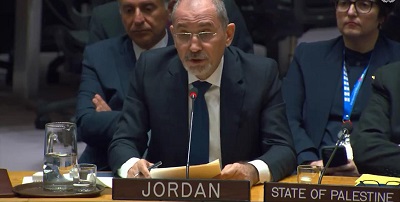 Jordan urges UN to recognise Palestine as state
Jordan urges UN to recognise Palestine as state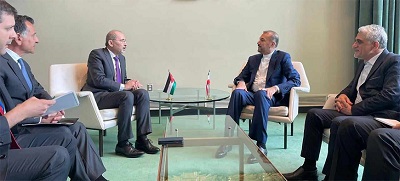 Safadi, Iranian counterpart discuss war on Gaza, regional escalation
Safadi, Iranian counterpart discuss war on Gaza, regional escalation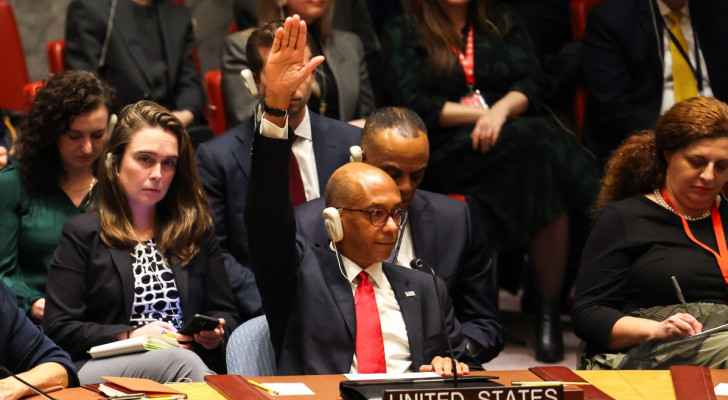 US vetoes Security Council resolution on full Palestinian UN membership
US vetoes Security Council resolution on full Palestinian UN membership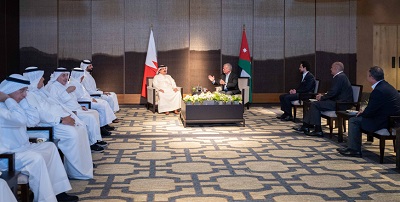 King, Bahrain monarch stress need to maintain Arab coordination
King, Bahrain monarch stress need to maintain Arab coordination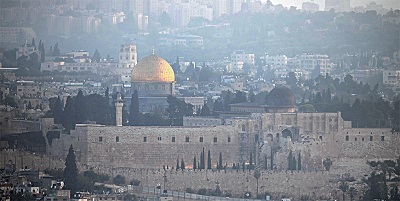 Security Council to vote Thursday on Palestinian state UN membership
Security Council to vote Thursday on Palestinian state UN membership
Most Read Articles
- Jordan urges UN to recognise Palestine as state
- Senate president, British ambassador discuss strategic partnership, regional stability
- JAF carries out seven more airdrops of aid into Gaza
- Temperatures to near 40 degree mark next week in Jordan
- Safadi, Iranian counterpart discuss war on Gaza, regional escalation
- US vetoes Security Council resolution on full Palestinian UN membership
- UN chief warns Mideast on brink of ‘full-scale regional conflict’
- Biden urges Congress to pass 'pivotal' Ukraine, Israel war aid
- Google fires 28 employees for protesting $1.2 billion cloud deal with “Israeli” army
- Israeli Occupation strike inside Iran responds to Tehran's provocation, reports say